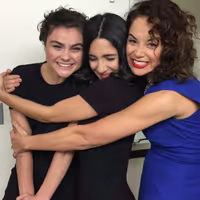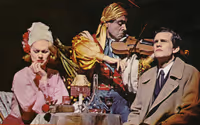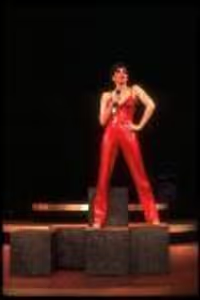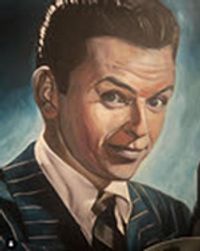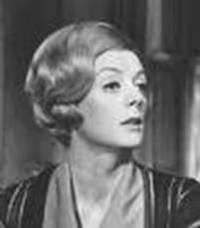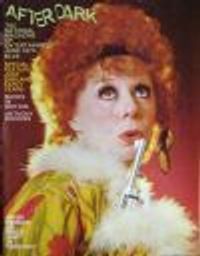PBS to air Lincoln Center Show Boat Friday
#25PBS to air Lincoln Center Show Boat Friday
Posted: 10/16/15 at 11:09pm
I like Norm Lewis, but not in this. He is not vocally right for Joe. Ol' Man River needs a voice that rings. I saw the '94 revival, the Washington National Opera (the SF Opera production), and what's currently airing on PBS. No one will ever come close to Michel Bell's Joe in the '94 revival. To me that particular production was perfect in my book.
#26PBS to air Lincoln Center Show Boat Friday
Posted: 10/16/15 at 11:16pm
Watching about an hour behind the broadcast.
Does Worsham have a pink streak in her hair (in the back)?
Thought for a while it was the lighting but just too many different angles showing it to be accidental...
Thanks in advance.
#27PBS to air Lincoln Center Show Boat Friday
Posted: 10/16/15 at 11:37pm
Uneven, but overall a respectful, if not inspired, presentation of the material. The camera work was quite splendid.
Norm was totally miscast. Someone like Phillip Boykin would've been better.
I thought Ovenden was stunning. So handsome and doesn't just sing like an opera guy, he has charm and such for days.
Highlight for me was "Bill". It was Williams' best moment and I also have always loved how the score has no piano until that scene where a character plays piano and it is featured for only that song. It really makes the song standout in a beautiful way. It was neat to see the Philharmonic be only the backup for the piano in that number.
#28PBS to air Lincoln Center Show Boat Friday
Posted: 10/16/15 at 11:42pm
Regarding Lauren's hair: I'm almost certain the color is because of the lighting.
Lauren sounds so great so far and she looks so gorgeous, ahh.
#29PBS to air Lincoln Center Show Boat Friday
Posted: 10/16/15 at 11:49pm
I finished a few minutes late and enjoyed the evening. I thought Lauren Worsham and Julian Ovenden were splendid together. Their notes (with him singing the melody with her) at the end of You Are Love...stunning. I agree that Norm Lewis wasn't correct as Joe. I love this score and I thought this concert was a safe but enjoyable presentation.
#30PBS to air Lincoln Center Show Boat Friday
Posted: 10/16/15 at 11:51pm
Vanessa looks stunning in that red gown!
#31PBS to air Lincoln Center Show Boat Friday
Posted: 10/17/15 at 12:02am
It was all very eh for me. The staging and choreography was baffling at times! But I still overall enjoyed it since it was my first time experiencing the show rather than just the score.
#32PBS to air Lincoln Center Show Boat Friday
Posted: 10/17/15 at 12:27am
20 minutes into it; Los Angeles here... A little disappointed so far. I recently purchased the San Francisco Opera production and thought it was a little too...well, operatic. However, I'd chose it over this production. So far...
#33PBS to air Lincoln Center Show Boat Friday
Posted: 10/17/15 at 1:29am
I also think that Kad summed it up succinctly. My best comparison is with the 1994 Hal Prince revival, and this Lincoln Center production just seems much smaller in comparison. Of course it was much smaller in terms of cast size and stage space. Everyone agrees that Norm Lewis can't approach the vocals of Paul Robeson or Michel Bell. (1994. I read somewhere that Bell has made a career out of playing Joe in regional and local productions.) But Norm has to stand out on that stage by himself while Bell had a dozen fellow river laborers as a chorus.
I think my favorite scene in the Prince production was the pantry scene, in which Julie (Lonette McKee) and then Queenie (Gretha Boston), both in high spirits, take on "Can't Help Lovin' Dat Man" before the large chorus takes over while the principals dance joyfully and a bit raggedly. Lincoln Center had no 70 person cast and not enough stage room to hold them if there were.
Both "Ol' Man River" and "Can't Help Lovin' Dat Man" from 1994 are up on YouTube.
There's also a seven and a half minute highlights clip from San Francisco Opera. You can see right away the quality of the vocals and of the overall production. But sometimes there is a price to be paid. Julie has a strong voice, but seems about twenty years too old and forty pounds too heavy to be a leading lady.
Updated On: 10/20/15 at 01:29 AM
#34PBS to air Lincoln Center Show Boat Friday
Posted: 10/19/15 at 12:24pm
I heard Philip Boykin sing "Ol' Man River" in concert and it was fantastic. I generally love Norm but Boykin would've been a better fit for Joe.
Phyllis Rogers Stone
Broadway Legend Joined: 9/16/07
#35PBS to air Lincoln Center Show Boat Friday
Posted: 10/19/15 at 1:33pm
I thought it was just okay. Norm Lewis has no business singing the part of Joe, though.
I also think it's weird when a separate actress plays grown-up Kim and they give her an entire number.
#36PBS to air Lincoln Center Show Boat Friday
Posted: 10/19/15 at 1:36pm
I made it through the first 30 minutes and then skipped to the curtain call. Norm Lewis is wrong for this. Vanessa Williams was Vanessa Williams.... ehhhh. This piece has always bored me.
#37PBS to air Lincoln Center Show Boat Friday
Posted: 10/20/15 at 9:38am
I don't understand why it is now required for a black actress to play Julie. It defeats the whole purpose of her passing as a white woman. Did this start with Cleo Laine in that London production?
#38PBS to air Lincoln Center Show Boat Friday
Posted: 10/20/15 at 8:58pm
StageStruckLad said: "I don't understand why it is now required for a black actress to play Julie. It defeats the whole purpose of her passing as a white woman. Did this start with Cleo Laine in that London production?"
I thought it's been frequently done with mixed-race actresses in the last few decades, although I agree with you in a way. I thought that maybe if you squinted you may think Vanessa was just a very tan white woman.
Phyllis Rogers Stone
Broadway Legend Joined: 9/16/07
#39PBS to air Lincoln Center Show Boat Friday
Posted: 10/20/15 at 9:03pm
It's not that new a notion. They originally wanted Lena Horne for 1951 movie.
Updated On: 10/20/15 at 09:03 PM#40PBS to air Lincoln Center Show Boat Friday
Posted: 10/28/15 at 1:06am
I rather enjoyed the production, but I must agree with everyone: as much as I love Norm Lewis, he should not have been cast - every time he sang, it just threw me off. I don't think Vanessa Williams had (or has) much of a stage presence. I thought Lauren was just wonderful, and Erika Henningsen was a great Kim.
And I don't think there is anything wrong with casting a mixed actress as Julie -- I prefer it that way, actually.
#41PBS to air Lincoln Center Show Boat Friday
Posted: 10/28/15 at 1:13am
Is it wrong that I actually really really enjoyed Williams' performance of "Bill," and that it's now one of my favorite renditions of the done to death song??
#42PBS to air Lincoln Center Show Boat Friday
Posted: 10/28/15 at 1:18am
^ No, not at all, especially since I really enjoyed the production, and many of the reviews here were lackluster. I just found Vanessa so wooden; that was my problem with her.
#43PBS to air Lincoln Center Show Boat Friday
Posted: 10/28/15 at 1:19am
I actually agree, she was mostly terrible in the book scenes. But that one song really worked for me.
#44PBS to air Lincoln Center Show Boat Friday
Posted: 11/9/15 at 5:30pm
Saw this over the weekend and enjoyed it a lot, although I do agree that Norm Lewis was not ideally suited to sing the role of Joe. Phillip Boykin would have indeed been ideal.
I was especially thrilled though to hear and see "It's Getting Hotter In The North" in the Kim featured song spot. William Hammerstein trashed that song mercilessly and needlessly in 1988 during the release of the McGlinn studio album, but I think he (and Norma Terris, who refused to sing it in the original production) were completely wrong about it. I love that a new song is introduced in that spot instead of a reprise of "Why Do I Love You?" plus the fact that it is based on Magnolia's piano exercise. And McGlinn was also right about the mournful harmonics in the orchestrations, which seem to be expressing a sorrow for the passing of time. It's a much more powerful number than just a jazzy arrangement of "Why Do I Love You?" With William Hammerstein no longer around, I hope all future productions of Show Boat will now include "It's Getting Hotter..."
#45PBS to air Lincoln Center Show Boat Friday
Posted: 11/10/15 at 3:00am
Thanks for the info, especially on the orchestration, which I hadn't noticed. Orchestrators never get enough credit.
Odd to me that this one closing song in Show Boat, never used even in the original production, and only recorded in John Mclinn's three CD blockbuster, which probably never broke the top 500 in sales, is so well known by so many. These are the liner notes on the CD recording:
This is the seldom heard and almost never performed song "It's Getting Hotter In The North." The lengthy number was dropped somewhere between the first Washington performance and the Broadway premiere, and was never used again. The number was set in the present (1927) and was led by Broadway star Kim Ravenal, featuring most of the cast in an array of specialty dances. The original Kim, Norma Terris, allegedly refused to sing it, so the authors replaced it with her specialty imitations act, set to the tune of "Why Do I Love You" from earlier in the play. In most modern productions the character of Kim is barely featured at all, so this number is naturally not used. This is also the only known recording.
I have trouble believing that Wm. Hammerstein or any one else could have influenced Hal Prince in not using "Hotter" given his great prestige and the size of his revival. It ran for 957 performances and set a new top ticket price of $75.00. Maybe he cut it for time. In a three hour show, even saving five minutes must seem useful. Somebody tweet Rebecca Luker.
Updated On: 11/10/15 at 03:00 AM#46PBS to air Lincoln Center Show Boat Friday
Posted: 11/10/15 at 9:19am
William was still alive at the time of Hal Prince's Show Boat. Given William's strong feelings that the song didn't work, "It's Getting Hotter..." might have been off the table as an option.
As originally written, and as recorded by McGlinn, it was indeed a very long number. But it was shortened effectively in this concert version. Here, it didn't run any longer than "Kim's Charleston," and musically and lyrically, it has more of a point and impact than reprising "Why Do I Love You?" with Kim singing to no one in particular, or a spot to perform celebrity imitations, as Norma Terris did in the original.
I also liked very much how it was staged in the concert. Through most of Show Boat, the black and white characters live separate lives and sing apart. They come together when Magnolia dances with Julie, Queenie and Joe and the ensemble for "Can't Help Loving Dat Man". But that scene takes place in private in a kitchen pantry in 1887. Here, Kim entertained with two black dancers at her side in 1927. While segregation reigned for another 40 years in the US, I did think that was a very effective choice.
#47PBS to air Lincoln Center Show Boat Friday
Posted: 11/10/15 at 3:04pm
Found this NY Times article about the McGlinn recording, where William Hammerstein also (foolishly) argues against the inclusion/reinstatement of "Mis'ry's Comin' Aroun'". If Jerome Kern wanted the song to be dropped, he wouldn't have had it published in the score, and it wouldn't have been the dominant motif of the original Overture.
http://www.nytimes.com/1988/09/25/theater/show-boat-makes-new-waves.html?pagewanted=all
#48PBS to air Lincoln Center Show Boat Friday
Posted: 11/10/15 at 10:16pm
Great find. Two hundred lost Kern manuscripts found in a warehouse in Secaucus? McGlinn only had the lyrics to "Hotter in the North" and without that find he never would have been able to match the words to the music and the song would have been lost forever?
Kern didn't dislike "Mis'ry's Comin' Around'" but original Broadway producer wanted that song and "Ol' Man River" cut because they were so depressing.
The Wikopedia article is pretty good. Has the song list for original Broadway premiere, and the revisions and changes made in the subsequent theater and film versions.
Videos





